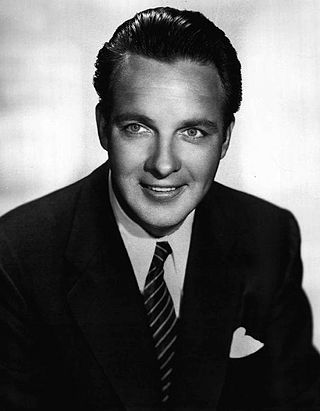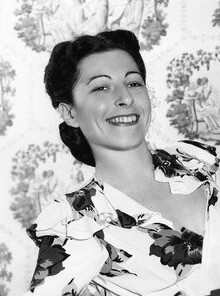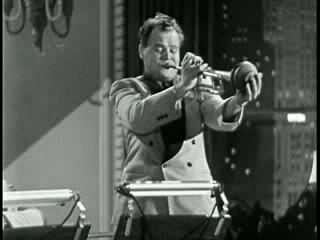
Harry Lillis "Bing" Crosby Jr. was an American singer and actor. The first multimedia star, he was one of the most popular and influential musical artists of the 20th century worldwide. He was a leader in record sales, radio ratings, and motion picture grosses from 1926 to 1977. He was one of the first global cultural icons. He made over 70 feature films and recorded more than 1,600 songs.

Danny Kaye was an American actor, comedian, singer and dancer. His performances featured physical comedy, idiosyncratic pantomimes, and rapid-fire novelty songs.

The Andrews Sisters were an American close harmony singing group of the swing and boogie-woogie eras. The group consisted of three sisters: contralto LaVerne Sophia Andrews, soprano Maxene Anglyn Andrews, and mezzo-soprano Patricia "Patty" Marie Andrews. The sisters have sold an estimated 80 million records. Their 1941 hit "Boogie Woogie Bugle Boy" can be considered an early example of jump blues. Other songs closely associated with the Andrews Sisters include their first major hit, "Bei Mir Bist Du Schön " (1937), "Beer Barrel Polka " (1939), "Beat Me Daddy, Eight to the Bar" (1940), "Don't Sit Under the Apple Tree " (1942), and "Rum and Coca Cola" (1945), which helped introduce American audiences to calypso.

George Robert Crosby was an American jazz singer and bandleader, best known for his group the Bob-Cats, which formed around 1935. The Bob-Cats were a New Orleans Dixieland-style jazz octet. He was the younger brother of famed singer and actor Bing Crosby. On TV, Bob Crosby guest-starred in The Gisele MacKenzie Show. He was also a regular cast member of The Jack Benny Program, on both radio and television, taking over the role of bandleader after Phil Harris' departure. Crosby hosted his own afternoon TV variety show on CBS, The Bob Crosby Show (1953–1957). Crosby received two stars on the Hollywood Walk of Fame, for television and radio.

Gary Evan Crosby was an American actor and singer. His parents were Bing Crosby, of whom he wrote a highly critical memoir, and the singer and actress Dixie Lee.

King of Jazz is a 1930 American pre-Code color musical film starring Paul Whiteman and his orchestra. The film title refers to Whiteman's popular cultural appellation. At the time the film was made, "jazz", to the general public, meant jazz-influenced syncopated dance music heard on phonograph records, on radio broadcasts, and in dance halls. In the 1920s Whiteman signed and featured white jazz musicians including Joe Venuti and Eddie Lang, Bix Beiderbecke, Frank Trumbauer, and others.
"Dear Hearts and Gentle People" is a popular song published in 1949 with music by Sammy Fain and lyrics by Bob Hilliard. The song refers to the singer's hometown, and different versions allude to a range of U.S. states.

Sylvia Fine Kaye was an American lyricist, composer, and producer. Many of her compositions and productions were performed by her husband, comedian Danny Kaye. Fine was a Peabody Award-winner and was nominated for two Academy Awards and two Emmys during her career. She won an Emmy award in 1976 for children's special.
"I Want to Be Happy" is a song with music by Vincent Youmans and lyrics by Irving Caesar written for the 1925 musical No, No, Nanette.

"My Melancholy Baby" is a popular song published in 1912 and first sung publicly by William Frawley. The music was written by Ernie Burnett (1884–1959), the lyrics by George A. Norton.

Charles William Butterfield was an American jazz bandleader, trumpeter, flugelhornist, and cornetist.

The Inspector General is a 1949 American Technicolor musical comedy film, suggested by the play by Nikolai Gogol. It stars Danny Kaye and was directed by Henry Koster. The film also stars Walter Slezak, Barbara Bates, and Elsa Lanchester. Original music and lyrics are by the associate producer Sylvia Fine, who was married to Danny Kaye, with Johnny Green credited for musical direction and incidental score.
What's New?" is a 1939 popular song composed by Bob Haggart, with lyrics by Johnny Burke. It was originally an instrumental tune titled "I'm Free" by Haggart in 1938, when Haggart was a member of Bob Crosby and His Orchestra. The tune was written with a trumpet solo, meant to showcase the talents of band-mate Billy Butterfield. Crosby's orchestra recorded "I'm Free" the same day it was written.
Jack Sperling was an American jazz drummer who performed as a sideman in big bands and as a studio musician for pop and jazz acts, movies, and television.
"Big Noise from Winnetka" is a jazz song co-written by composer and bass player Bob Haggart and drummer Ray Bauduc with lyrics by Gil Rodin and Bob Crosby, who were members of a sub-group of the Bob Crosby Orchestra called "The Bobcats". They also were the first to record it, in 1938. That recording is remarkable for its unusual duet feature: Haggart whistles the melody and plays the bass, while only Bauduc accompanies him on the drums. Halfway through the solo, Bauduc starts drumming on the strings of the double bass, while Haggart continues to play with his left hand, creating a percussive bass solo. The original version was just bass and drums, but many other arrangements have been performed, including one by the Bob Crosby big band with the band's vocal group.

"Way Down Yonder in New Orleans" is a popular song with music by John Turner Layton Jr. and lyrics by Henry Creamer. First published in 1922, it was advertised by Creamer and Layton as "A Southern Song, without A Mammy, A Mule, Or A Moon", a dig at some of the Tin Pan Alley clichés of the era.
Judd "Jud" Conlon was an American vocal arranger and conductor.

'Bing and the Dixieland Bands is a Decca Records album by Bing Crosby featuring songs with a Dixieland flavour which was issued as a 10” LP with catalog No. DL5323 and as a 4-disc 78rpm box set (A-852) and as a 4-disc 45rpm set (9–232).
The music soundtrack of the Fallout series is composed of both licensed music from the mid-century's Jazz Age to the Space Age, as well as original scores by Mark Morgan, Matt Gruber, Devin Townsend, and Inon Zur. The series also features original songs and covers commissioned for the games as diegetic music heard in the world of Fallout.












